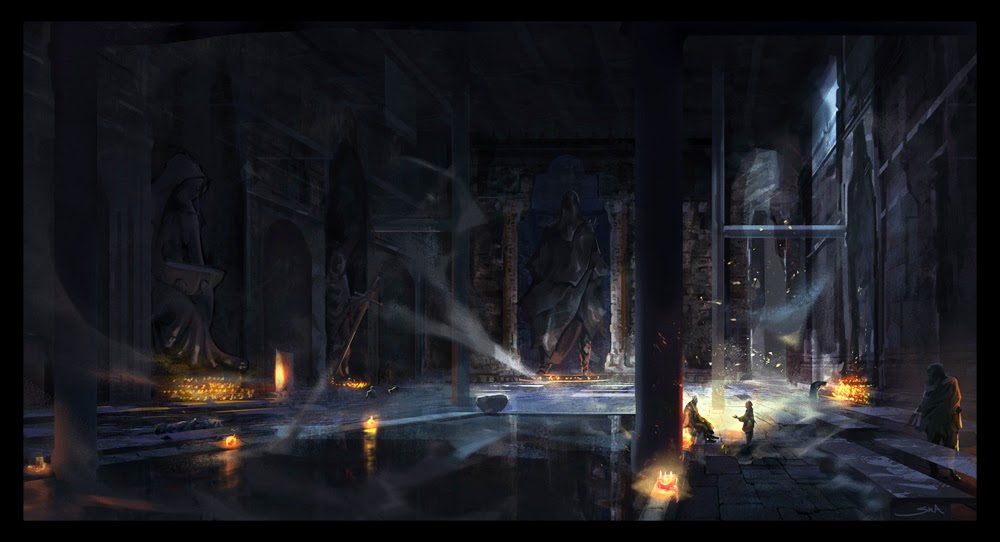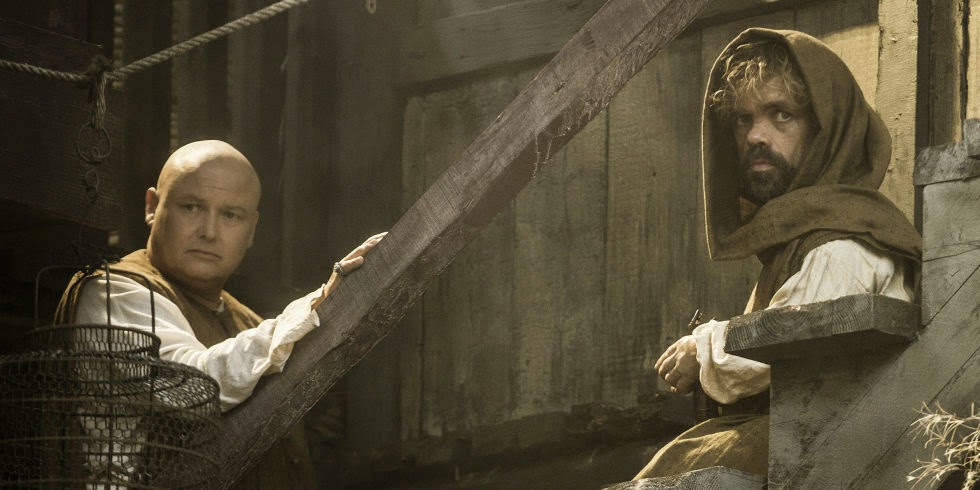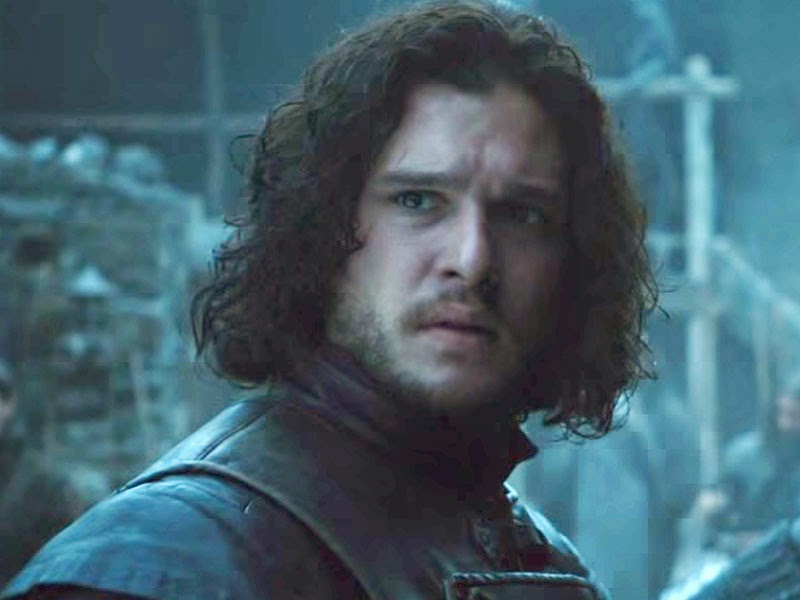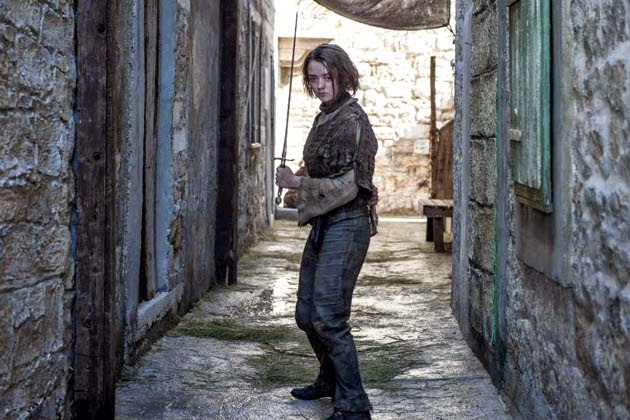This was the running theme of this episode, from Arya choosing to become nobody to Cersei discovering where she has landed now as the Queen Mother, to Jon growing into his role as the Lord Commander, to Sansa discovering just what will be asked of her in maintaining her new role as the last link back to the ancient Stark family. Indeed, the entire storyline is essentially a testament to discovering who these characters are, whether they're growing up and learning how to deal with the world as the Stark children have or discovering how they're going to live in a world of utter turmoil, as most of the rest of the characters have had to discover (or have died trying to; as Stannis noted: "Honor got your father killed." True 'dat.) It was appropriate, of course, to begin an episode about changing or transforming identities in the House of the Many-Faced God, who knows all of these paths which, in the end, all lead to the same resolution ("There is only one god and all men know his gift.")
In the course of going through this journey of self-discovery in this episode, we are way, WAY off the books now in a couple areas (most prominently Tommen and Sansa) so it's a new adventure for everyone. The prevailing question now will be whether we as viewers are willing to trust D&D on their vision of how these characters handle these transformations, since it likely won't be in lockstep with Martin's. Indeed, it never has been, since they've deviated before and, interestingly, Martin has almost always said that he'd have preferred to follow D&D's path if he could go back and rewrite parts of the books. Admittedly, there are ways to deviate like Sansa, which is likely just a matter of them showing stuff that's going to occur in Winds, since her activities are pretty huge in the grand scheme of things, and then there are ways like Tommen, which kind of has to be done given that Tommen is a boy of eight in the books and not the teenager that he is in the show. I think that it's the showrunners' taking advantage of the benefit of hindsight, in that the story is already set down, so they can just pick over the parts they know and make tweaks to upgrade it. The characters, of course, get no such test runs so they have to make certain decisions on the fly. As we saw with Tyrion, sometimes that doesn't work out so well. Believe me, there were a couple more that are going to be almost as bad for the deciders in question, but I'll continue to refrain from book spoilage right up to the moment where it's past my ability to do so.
Since self-discovery was kind of the theme, I thought it was worthwhile to have even more than the usual number of great character interaction scenes. The most notable for me was the discussion between Pod and Brienne about their respective unusual pasts that led them to being squire and (almost) knight. Podrick's story is true to his character in the books (except that it was Kevan Lannister who brought him to Kings' Landing), while Brienne's is not but is roughly the same. I mentioned last week that Podrick remaining as cheap theater to Brienne's quest would get tiresome quickly and I'm glad to see that they've led the two to a deeper understanding of each other in the very next episode. Brienne, at this point, has come to understand that treating Pod the way she has is a reflection of how she's been treated. Societal change begins with the individual and all that. This is where I really miss the Hound who'd have made that point in blunter terms and much more quickly.
The next was Petyr and Sansa's moment where he reveals just what maneuvers he has in mind to try to cement his position with the North. It's a sign that Baelish's mind is always turning. He knows that most of the people left in the capital are foolish or weak or already outflanked, so he immediately began moving upon Tywin's death (as he reminds Roose Bolton) to resurrect the old alliance between the North and the Vale. However, the key point in the exchange between Littlefinger and the last link to the Starks wasn't Sansa steeling herself to go home and face the Boltons, but instead Baelish's face while he was delivering his pitch to get her to do so. The whole time he didn't look in her eyes while trying to make his sale. Of all the characters in the story, the one who is most sure about just who and what he is happens to be Petyr Baelish. Why would he not be able to maintain the mask in this case? He mentioned later that he knows little of Ramsay Bolton. Was he lying there and, thus, not able to entirely lie to Sansa? Seems unlikely, but it was interesting to see nonetheless. On top of that, Sophie Turner's face when she first greets Lord Bolton and as she slides right into character as the dutiful noble lady, participating in the game, was excellent. The fact that she's reassured right away by the common folk staffing the castle ("The North remembers.") should lead to some interesting events in the weeks ahead. Later, Roose and Petyr sparring over the direction ahead for both their houses was intriguing, as the mistrust between these two liars and traitors (ahem) reeks.
But the best scene of this type (indeed, perhaps the best scene of the episode) was the confrontation between Margaery and Cersei after the latter has realized that Margaery has truly stolen her son and Cersei is, at long last, an afterthought in the game. Margaery, as the Elizabeth Taylor of Westeros, has finally secured her position with the teenaged king: horizontally, the best way possible, and she's finally seeing fit to exercise the benefit of that position with the Queen Mother (or is it 'Dowager Queen'?) Cersei, for her part, turns in an excellent look of death when she reassures the queen of being able to provide "Anything you need." In the land where women are usually property and disempowered, it's unfortunate that Cersei can't recognize the opportunity to make alliances in the way her father did, but some people just think they're good at the game when they're really not. Her earlier realization on the ride to the wedding, as people shouted Margaery's name, is just reinforcement of that failure.
In that respect, it was almost refreshing to watch Stannis' meeting with Jon and see the former basically lay out the map of how the game works and what he would need for it to work well. Jon, true to his vows, ain't havin' any. It's an interesting conflict between the man who is heeding his oath (Jon) and the man who insists that everyone play by the rules... except when it's necessary to make things really work as he'd like them. As noted, his contempt for Ned Stark when he didn't do so is apparent but it also shines a slightly brighter light on Stannis' hypocrisy. Experience makes liars of us all? Perhaps.
And, of course, it was fitting to return to Arya to discover this greatest of transformations, as the willful, proud, determined, hardened young woman realizes that all of that must be left behind to make the transition that she wants and now believes will be the way to fulfilling all that she has hardened herself to complete. We see the most real emotion that we've seen from Arya in some time (There's almost nothing as hilarious on the show at this point as watching Maisie Williams yell: "Ow! Cunt!"), both in her outrage at how she's been treated and in her genuine grief at being told to separate herself from the one totem, Needle, that remains her only tie to the House of Stark and to her former teacher, who first taught her that there was only one god. In the end, she can't make that complete separation. It reminds me of Luke trying to heed all of Yoda's advice to release his fear and become a true Jedi. In the end, it seemed to work even though he appeared to fail. Now we'll see how Arya works through it. You can become no one, but you cannot abandon yourself.
Bits and pieces:
Reader outrage! The line! They missed the line! Jon Snow's greatest line in all 4500 pages of the books currently in print... and they left it out! This is far worse than Littlefinger changing a throwaway comment when he pitched Lysa out the Moon Door. This was the line! For those who aren't readers, this isn't a spoiler, as the moment is the same when Jon executes Janos Slynt. But the best part about that whole sequence is when Slynt is walking off and thinking he's gotten away with his usual crap and Jon turns and says: "Edd, fetch me a block." Otherwise, they got the rest of the scene generally right, with Stannis looking on in approval. So, it still worked, but I think they missed a great opportunity.
I thought the whole High Septon sequence and Cersei's visit to the High Sparrow was well done. There are, of course, major implications to all of that and it was interesting to hear Ser Meryn utter his first moment of wisdom: "I don't think this is a good idea."
Lines of the week: (A lot of good ones this week.)
"I didn't come here to sweep floors."
"No? Why come then?"
The implacability of Jaqen H'ghar is is his most endearing feature.
"It was all over so fast."
"Yes."
D'oh! Sorry, Tommen. That'll improve with experience.
"This is all I want to do, all day, every day, for the rest of my life!" You and every other teenaged boy. And most men.
"I flayed him living, along with his wife and brother. Made his son watch."
"And...?"
"The new Lord Cerwyn paid his taxes."
Funny how that works.
"There's no justice in the world. Not unless we make it."
Petyr sounding like Stannis.
"A man can be killed."
Brienne sounding like Jaqen.
"I heard it was best to keep your enemies close."
"Whoever said that didn't have many enemies."
Stannis' logic never fails to impress.
"Who are you?"
"You're about to find out!"
Maisie is still amazing.
"It's good luck to rub a dwarf's head."
"It's even better luck to suck a dwarf's cock."
Varys' expression at this one was priceless.
"Someone who inspires priests and whores is worth taking seriously."
Hard to argue this.
And the winner:
"I wish we had some wine for you. It's a bit early in the day for us." Oh. My.




















